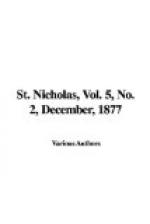The engraving shows you how Miss Alcott looks,—only you must recollect that it does not flatter her; and if you should see her, you would like her face much better than the picture of it. She has large, dark-blue eyes, brown clustering hair, a firm but smiling mouth, a noble head, and a tall and stately presence, as becomes one who is descended from the Mays, Quincys and Sewalls, of Massachusetts, and the Alcotts and Bronsons of Connecticut. From them she has inherited the best New England traits,—courage and independence without pride, a just and compassionate spirit, strongly domestic habits, good sense, and a warm heart. In her books you perceive these qualities, do you not? and notice, too, the vigor of her fancy, the flowing humor that makes her stories now droll and now pathetic, a keen eye for character, and the most cheerful tone of mind. From the hard experiences of life she has drawn lessons of patience and love, and now with her, as the apostle says, “abideth faith, hope, charity, these three; but the greatest of these is charity.” There have been men, and some women too, who could practice well the heavenly virtue of charity toward the world at large, and with a general atmospheric effect, but could not always bring it down to earth, and train it in the homely, crooked paths of household care. But those who have seen Miss Alcott at home know that such is not her practice. In the last summer, as for years before, the citizen or the visitor who walked the Concord streets might have seen this admired woman doing errands for her father, mother, sister, or nephews, and as attentive to the comfort of her family as if she were only their housekeeper. In the sick-room she has been their nurse, in the excursion their guide, in the evening amusements their companion and entertainer. Her good fortune has been theirs, and she has denied herself other pleasures for the satisfaction of giving comfort and pleasure to them.
“So did she travel
on life’s common way
In cheerful godliness;
and yet her heart
The lowliest duties
on herself did lay.”
THE BOY WHO JUMPED ON TRAINS.
BY MARY HARTWELL.
There was a boy whose name was Dunn,
And he was one
As full of fun
As any boy could walk or run!




